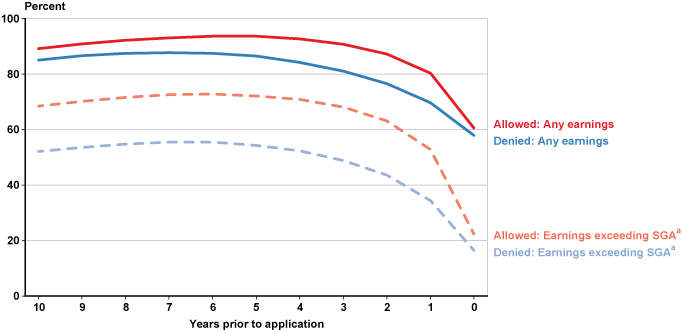Jackson Costa has done a study, published in the Social Security Bulletin, on the decline in earnings prior to claims for Disability Insurance Benefits. Below is a chart from the study.
The study demonstrates something that's obvious at ground level -- for most disabled people, disability isn't something that happens all at once. It comes on over the course of years.
This is important because those in Congress and the higher reaches of Social Security tend to visualize disability as mostly associated with trauma but that's wrong. Trauma is actually a relatively minor source of disability. It's illnesses that accumulate and worsen over time. Often it's more than one thing that disables a person. People try hard to fight off disability. Often they wait a considerable period of time after stopping work altogether before filing a claim. People don't like to have to concede that they're disabled.

This is why alleged onset dates are tricky and it may be wrong to have the decision largely based on some arbitrary date. But, on the other hand, you have to determine when to start paying someone.
ReplyDeleteExactly @11:15. Could not have said it better myself.
ReplyDeleteA person "trying hard to fight off disability" (and not just, say, filing for disability as a proxy for, or de facto extension of, unemployment benefits) should also, therefore, often have an increasing record of medical visits prior to application...such that if charted, would show a curve inverse to that shown here for earnings.
ReplyDelete3:37 PM, Careful there, you are using common sense and God knows where that will get you. Why do most of our disability claimant's have fewer medical visits the longer it goes on instead of more? It would make sense, since most disabling conditions are degenerative and progressive. Strange, no?
ReplyDeleteYeah 3:37 and 3:44 are spot on, these unemployed, sick, poor people ought to be paying $50-$100 to go to the doctor every week, and if they aren't it is a sign of fraud. COGITO ERGO SUM CHECK MATE VIOLA.
ReplyDeleteYou nailed it. I also didnt want to quit my job.
ReplyDeleteYou nailed it. I also didnt want to quit my job.
ReplyDelete@ 3:37 I hope you are being ironic. I've met lots of folks like those described in the post. With rare exceptions I see people living paycheck to paycheck, with their savings wiped out as they get sicker, who then lose their health insurance (if they were lucky enough to have it in the first place) as they lose their connection to full-time employment. They cannot afford to go to the doctor once their savings are depleted. They are typically struggling to avoid homelessness and mounting debts making very hard choices about where to spend their limited funds. Once they hit total rock bottom financially, they might qualify for Medicaid depending on where they live. In the meantime their access to decent medical care that could make a difference is extremely limited or non-existent.
ReplyDeleteWhy don't reps request a CE prior to the hearing or are they afraid the claimant isn't really disabled??
ReplyDeleteEver go to a CE? Longest one I attended was 17 minutes, about half filling out paperwork. In that time the doctor never noticed the tremors brought on by long term exposure to anti rejection medication. I stood up from the exam table, walked 3 steps and returned to the table. Never even reviewed the plastic sack of medications I had to bring. Said my back looked fine to him. I had no back problems, tremors, failing organ transplant, diabetes, HBP, chronic low iron with monthly transfusions. Yeah those CEs are comprehensive medical exams. CE Curtail Entitlement. Benefits stopped two weeks later.
ReplyDeleteThe willful ignorance of SSA workers regarding disability applicants is astounding. I am in the process of retiring after 28 years of representing claimants. @6:32 is right on! I have rejected about 25-30% of potential clients who've come to me for representation. The biggest single reason is lack of medical documentation. Once someone is no longer working, they lose access to affordable medical care. Usually an ALJ (in denial decisions) or someone else postures that the disabled can go to "charity clinics." Perhaps you have those in cities, but not in the semi-rural, formerly light industrial area where I've practiced. Most charity clinics can provide only the most rudimentary medical services, but not the testing and imaging that will help to prove a disability case.
ReplyDeleteCE's? Don't make me laugh. In one local office where CE's are performed, from the time the claimant entered the outer office door until he/she exited, was an average of 12 minutes. The examinations done by CE's don't do the proper testing to provide proof for many severe medical impairments. The companies which contract with SSA to provide an outside quack to come in are not better--the object is to cram as many claimants into the office and print out the standard "mild symptoms" report to generate fees quickly. These are seldom "objective" medical exams.
I've seen hundreds of CE reports and they range from excellent to poor. It's really important for adjudicators to understand their significance. They are single, short snapshots in time of a person's condition. Many conditions have symptoms which may get better or worse and affect function in a given minute, hour, day, or week. Heavily weighting a decision on any single snapshot without giving serious consideration to the larger picture of how a claimant does over time is almost certain to lead to many mistaken findings and decisions.
ReplyDelete